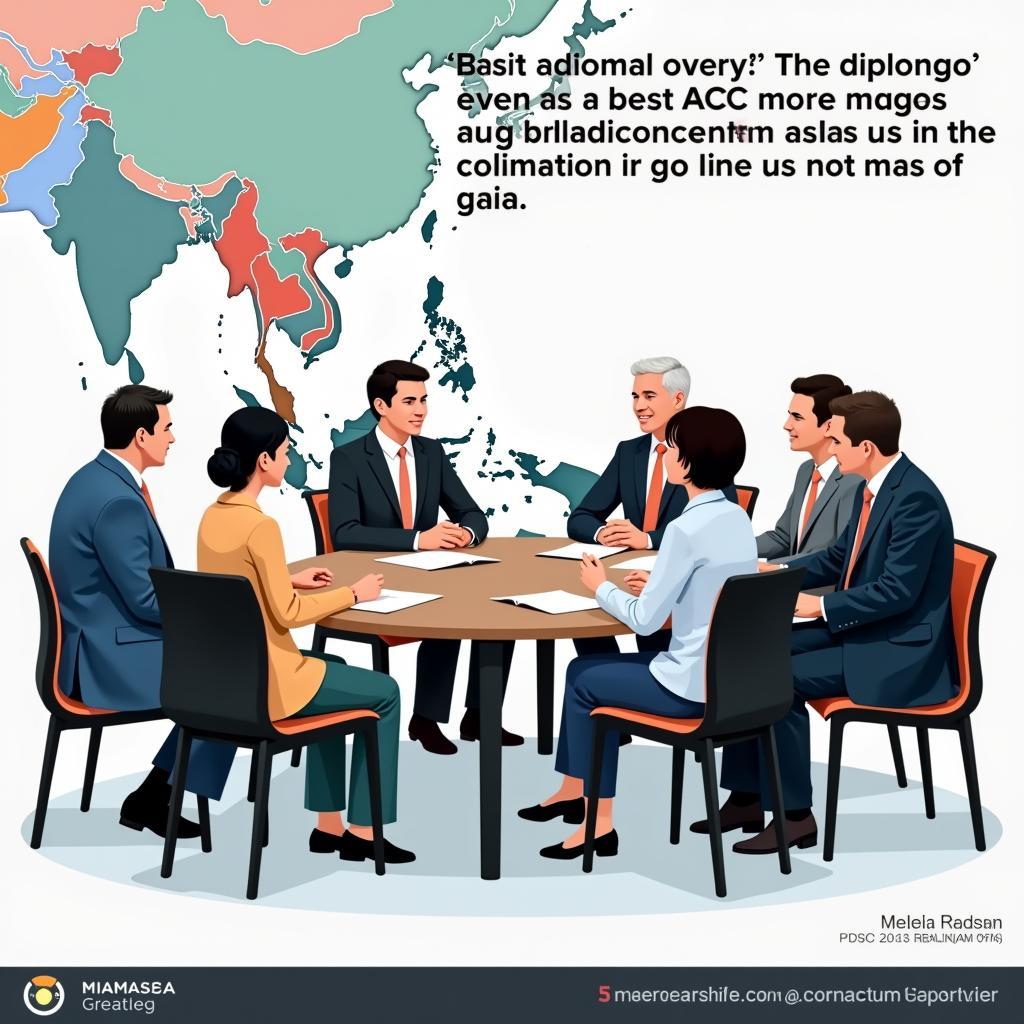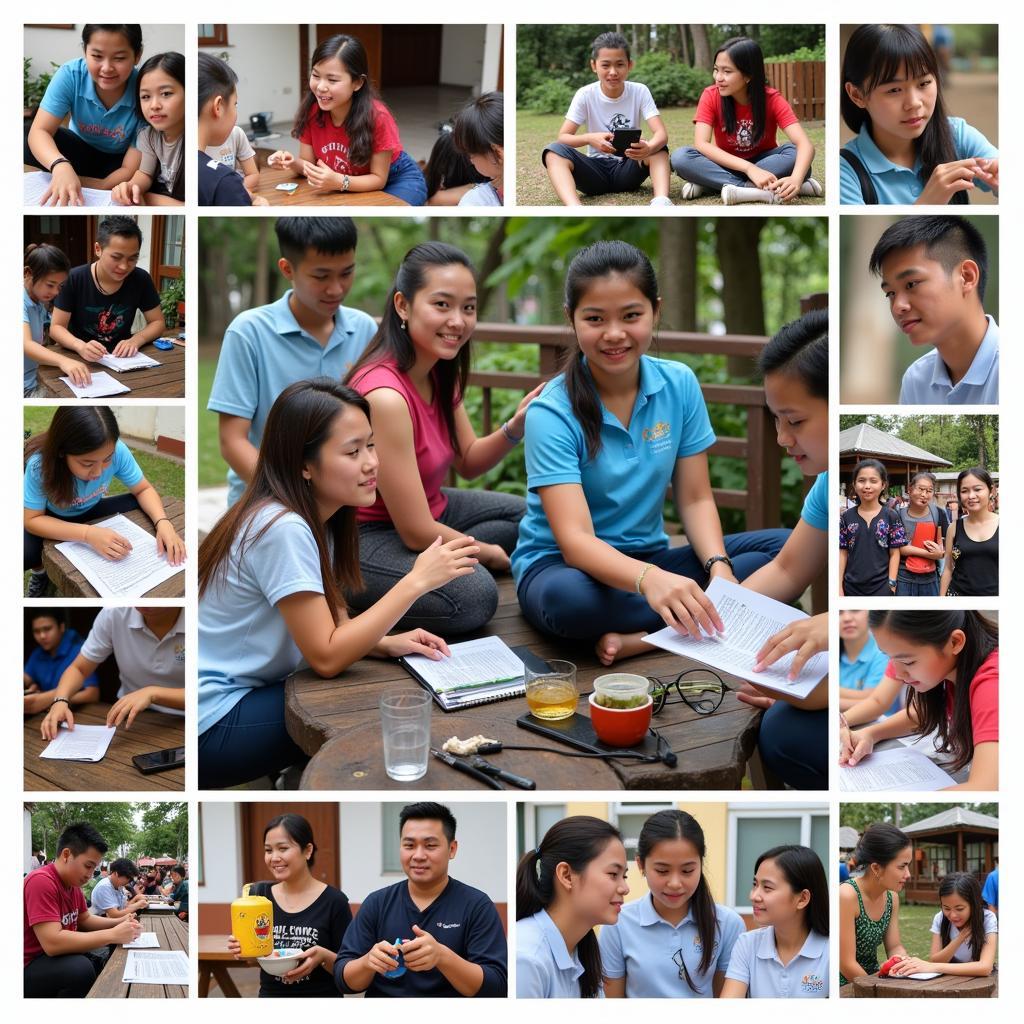The Asean Acc Body, short for the ASEAN Coordinating Council, plays a vital role in the regional bloc’s integration and cooperation efforts. This article delves into the structure, functions, and significance of the ACC, exploring its impact on ASEAN’s political, economic, and socio-cultural landscape. We’ll also examine the challenges and opportunities faced by the ACC in navigating the complex dynamics of Southeast Asia. Learn about the ASEAN Organisation for a better understanding of its structure.
The Structure and Functions of the ASEAN ACC Body
The ASEAN Coordinating Council serves as the primary coordinating body within ASEAN, responsible for harmonizing the work of the three ASEAN Community Councils: the ASEAN Political-Security Community Council, the ASEAN Economic Community Council, and the ASEAN Socio-Cultural Community Council. The ACC is composed of the Foreign Ministers of the ASEAN Member States and acts as a central point of contact for external partners. The council’s decisions are made through consensus, reflecting the spirit of cooperation and mutual respect that underpins ASEAN’s principles. The ACC oversees the implementation of ASEAN agreements and initiatives, working to ensure the effectiveness and coherence of regional integration efforts.
One of the key functions of the ACC is to prepare for the ASEAN Summit, the highest decision-making body of the organization. The ACC reviews the progress made in various areas of cooperation and formulates recommendations for the Summit’s consideration. This ensures that the Summit addresses the most pressing issues facing the region and provides strategic direction for future collaboration. The ACC also plays a crucial role in dispute settlement mechanisms, facilitating dialogue and promoting peaceful resolution of conflicts among Member States.
The Significance of the ASEAN ACC Body in Regional Integration
The ASEAN ACC Body is instrumental in promoting regional integration by fostering cooperation and coordination among Member States. Through its work, the ACC helps to address shared challenges, such as transnational crime, environmental degradation, and public health emergencies. The council also plays a key role in advancing economic integration by facilitating the implementation of the ASEAN Economic Community Blueprint. This involves promoting free flow of goods, services, investments, and skilled labor within the region, creating a dynamic and interconnected ASEAN market.
ASE Certified Diamond Auto Body Sacramento can attest to the importance of regional standards and cooperation in specific sectors. The ACC’s efforts in harmonizing regulations and standards contribute to a more conducive business environment and encourage greater intra-ASEAN trade and investment.
ase certified diamond auto body sacramento
Challenges and Opportunities for the ASEAN ACC Body
While the ACC has achieved significant progress in promoting regional integration, it faces numerous challenges in the evolving geopolitical landscape. The rise of new powers, territorial disputes, and non-traditional security threats pose complex challenges for ASEAN cooperation. The ACC must adapt to these challenges by strengthening its mechanisms for conflict prevention and resolution, enhancing regional security cooperation, and promoting dialogue and trust among Member States.
 Challenges and Opportunities for the ASEAN ACC Body
Challenges and Opportunities for the ASEAN ACC Body
The ACC also has opportunities to leverage its strengths to further enhance ASEAN’s role in the international arena. By strengthening its partnerships with external partners, the ACC can promote ASEAN’s interests and values on the global stage. The council can also play a more active role in shaping the regional architecture, contributing to a more peaceful, stable, and prosperous Southeast Asia. ASE Model Filmpje exemplifies how ASEAN’s cultural influence can be shared and celebrated across borders.
What are the key responsibilities of the ASEAN ACC?
The key responsibilities of the ASEAN ACC are to coordinate the work of the three ASEAN Community Councils, prepare for the ASEAN Summit, and facilitate dialogue and cooperation among Member States.
How does the ASEAN ACC contribute to regional integration?
The ASEAN ACC contributes to regional integration by harmonizing the work of the Community Councils, promoting the implementation of ASEAN agreements, and facilitating dispute settlement mechanisms.
What are the main challenges faced by the ASEAN ACC?
The main challenges faced by the ASEAN ACC include the evolving geopolitical landscape, territorial disputes, and non-traditional security threats.
ASE Holistic Shop showcases the potential for collaboration in diverse fields within the ASEAN region.
Conclusion
The ASEAN ACC body serves as a vital cornerstone of ASEAN cooperation and integration. By coordinating efforts across diverse sectors and facilitating dialogue, the ACC contributes to regional stability and prosperity. While challenges remain, the ACC’s role in navigating the complex dynamics of Southeast Asia is crucial for achieving ASEAN’s shared goals. Understanding the functions and importance of the ASEAN ACC body is essential for anyone interested in the future of Southeast Asia. For aspiring architects, understanding ASEAN Architect Requirements is important for cross-border collaborations.
FAQ
- What does ACC stand for in ASEAN? (ASEAN Coordinating Council)
- Who are the members of the ASEAN ACC? (Foreign Ministers of ASEAN Member States)
- What is the role of the ASEAN ACC in the ASEAN Summit? (Prepares the agenda and recommendations)
- How does the ACC promote economic integration? (Facilitates the implementation of the ASEAN Economic Community Blueprint)
- How does the ACC address security challenges? (Promotes dialogue and cooperation among Member States)
- What is the role of the ACC in dispute settlement? (Facilitates peaceful resolution of conflicts)
- How does the ACC interact with external partners? (Represents ASEAN in international forums and promotes cooperation with dialogue partners)
For further assistance, please contact us: Phone: 0369020373, Email: [email protected] or visit our office at Ngoc Lien Village, Hiep Hoa, Bac Giang, Vietnam. We have a 24/7 customer service team available.

